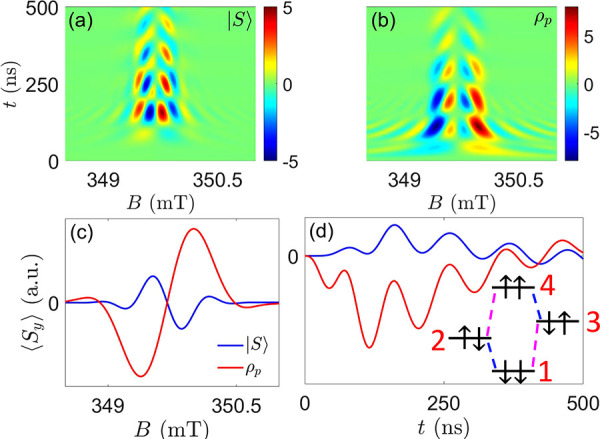Figure 4.

TR-EPR
on a randomly oriented ensemble of D-χ-A molecules.
Parameters: Δg = 0.002, rDA = 25 Å, hν = 9.8 GHz. (a) and
(b) Two-dimensional maps of ⟨Sy(t, B)⟩
for an initial singlet or polarized state, respectively. (c) Field
dependence of the absorption TR-EPR spectrum, integrated in the time-window
corresponding to the first maxima-minima in the maps of panels (a)
and (b), for the states  , ρp (with
either p = −1 or p = 1, leading
to the same result in solution). (d) Time dependence around B ≈ 349.5 mT, highlighting the opposite behavior
at short times for polarized and unpolarized states. Simulations include
relaxation, dephasing, and recombination of the radical pair, with T1 = 2 μs, T2 = 0.5 μs, TR =
10 μs (in the singlet–triplet RP basis, see the Supporting Information), and Gaussian broadening
with fwhm = 0.15 mT.36 Inset: schematic
energy-level diagram, with states practically corresponding to eigenstates
of Szi. Allowed EPR transitions
of D (A) are indicated by blue (purple) dashed lines.
, ρp (with
either p = −1 or p = 1, leading
to the same result in solution). (d) Time dependence around B ≈ 349.5 mT, highlighting the opposite behavior
at short times for polarized and unpolarized states. Simulations include
relaxation, dephasing, and recombination of the radical pair, with T1 = 2 μs, T2 = 0.5 μs, TR =
10 μs (in the singlet–triplet RP basis, see the Supporting Information), and Gaussian broadening
with fwhm = 0.15 mT.36 Inset: schematic
energy-level diagram, with states practically corresponding to eigenstates
of Szi. Allowed EPR transitions
of D (A) are indicated by blue (purple) dashed lines.
